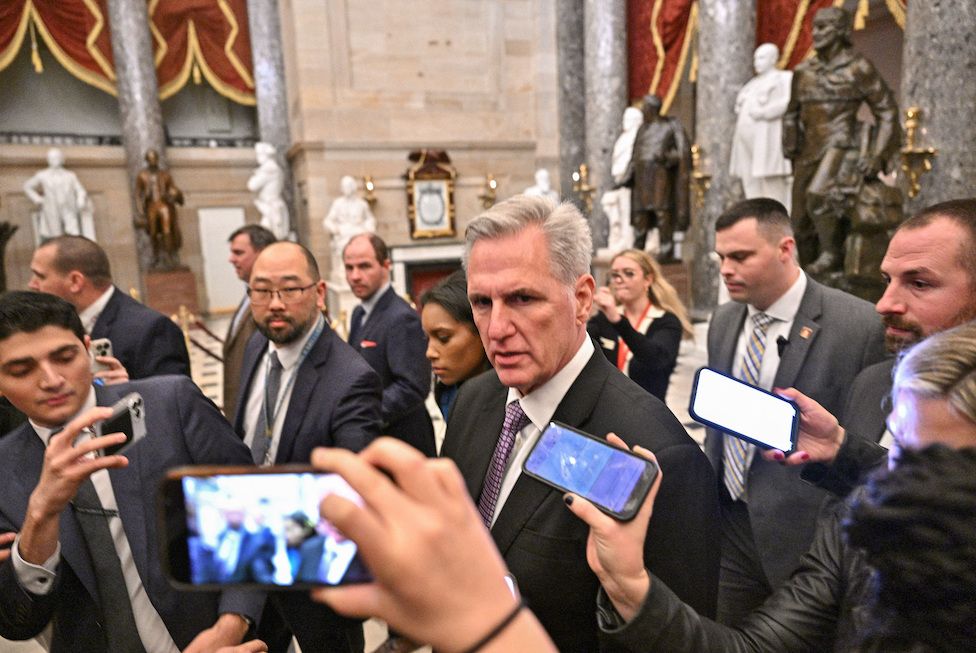
By Anthony Zurcher
North America correspondent
A third day of voting got underway on Thursday but it is unclear if the US House of Representatives is any closer to electing a Speaker. Will fresh concessions that emerged overnight break the deadlock?
Republicans won the chamber in the midterm elections but Kevin McCarthy, who has served as the party’s House minority leader for four years, has 20 Republicans standing between him and the gavel – and they aren’t budging.
Matt Gaetz, one of those so-called “Never Kevins”, described Mr McCarthy as a “desperate guy” and said his request was simple: “For him to drop out of the race.”
But Mr McCarthy is still in the running despite being defeated in two further rounds of voting on Thursday.
Here are three ways the situation could unfold:
1. Kevin McCarthy prevails
The current strategy from Kevin McCarthy appears to be to fight a war of attrition. His supporters will keep placing his name in nomination until those in opposition get tired of voting against him. Doing the same thing but expecting different results may be the definition of madness, but it may also be their only option until they can figure out what the rebels really want.
Overnight on Wednesday, Mr McCarthy offered a number of concessions including a seat on the influential rules committee, which sets the terms for debate on legislation in the chamber. He also agreed to lower the threshold for triggering a vote on whether to unseat the speaker to only one House member.
While these offers may be able to win over some of the holdouts, they may not be enough to get him all the way to the finish line. His hope is that momentum toward victory would increase the pressure for those opposing him to throw in the towel and placate rank-and-file members on his side who are getting increasingly frustrated at the ongoing deadlock.
The ultimate challenge is that these concessions will weaken his hold on power should he win, making it more likely that he could face multiple votes to dethrone him when the really tough fights – on things like the budget and raising the debt ceiling – take place later in the year.
Mr McCarthy could also hope that Democrats tire of the fight and stop showing up for the speaker votes, lowering the margin necessary for him to win a majority. At least so far, however, Democrats appear to be relishing the Republican chaos.
2. Kevin McCarthy gives up
Surrender has to be considered a possible, even likely, outcome for Mr McCarthy after more than two days of failure. At some point, the Republicans who are currently supporting Mr McCarthy may decide the best move is to give the hardline Republicans their scalp and try to move on.
“We’re starting to get some open conflict on the floor as well as behind closed doors,” Mr Buck, who has voted for Mr McCarthy all six times, said on Wednesday afternoon. “We have to choose a speaker and move forward.”
Steve Scalise, the Republicans’ chief vote-counter, is perhaps the choice best positioned to be a candidate acceptable to both the conservative hardliners and the rest of the House Republicans. He is considered a staunch, southern conservative and has literally bled for the party, having been seriously wounded in the 2017 attack on Republican members of Congress during a baseball practice. The biggest obstacle at the moment is that he doesn’t seem to want the job.
Other possibilities include firebrand congressman Jim Jordan of Ohio and Jim Banks of Indiana, the head of the conservative Republican Study Committee. Neither seems capable of unifying the entire party behind them, however. (Byron Donalds of Florida was the nominee of the anti-McCarthy Republicans three times on Wednesday, but the novice congressman has been more of a vessel for anti-McCarthy sentiment than a serious candidate.)
3. The two parties agree on compromise candidate
Democrats and Republicans in the Ohio state House of Representatives joined together on Tuesday to reject a more conservative speaker and elect a moderate compromise candidate. Could such a thing happen in the US House of Representatives, as well?
There’s been plenty of such speculation, as Mr McCarthy’s predicament became clearer in recent days. Some of that has been fanned by his supporters as a warning for conservative hard-liners to fall in line, but some of it is real.
Image source, Getty Images
A group of Republicans, including Matt Gaetz (R), huddle in the House chamber
Don Bacon, a centrist Republican from Nebraska, has previously expressed an openness to working with Democrats to elect a compromise speaker if Mr McCarthy fails. Fred Upton, a former Republican congressman from Michigan with moderate credentials, has expressed an openness to presenting himself as a coalition pick (there is no requirement that a speaker has to be a current member of Congress). And there’s been some talk of sweeteners for Democrats, like rule changes that would allow them to introduce legislation or more committee power.
All of this would require a sizeable number of Democrats to go along with the plan, which in today’s sharply divided partisan environment seems unlikely in the extreme. And any Republican who works with Democrats will instantly be persona non grata among most conservatives.
Given that the House is already in uncharted territory by modern standards, however, no options are too far-fetched at this point.
Watch: Kevin McCarthy’s difficult Tuesday – in 90 seconds

